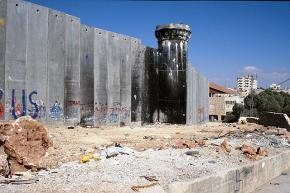A state of de-legitimacy
is a professor at Bethlehem University and author of the new book Popular Resistance in Palestine: A History of Hope and Empowerment. He has been an activist for Palestinian rights for decades, facing continual harassment and arrest. Here, he describes Israel's continuing repression of Palestinians--and the development of an international solidarity movement in defense of Palestinians.
IT HAS been some 130 years since the first European Jewish settlement was established with the explicit aim of taking over the country. The few thousand native Palestinian (Arab) Jews did not support Zionism. Christians and Muslims opposed it over the decades, mostly by nonviolent popular resistance as I detailed in my just released book Popular Resistance in Palestine: A History of Hope and Empowerment.
This popular resistance included at least 15 waves of uprisings, called Intifadas, in the past few decades. The results of both the violent colonial settler activity and the resistance to it have been mixed.
The last six decades witnessed the development of a militarized "Jewish state" that subsists on security-related exports, mostly to the U.S., and foreign aid, mostly from the West. Millions of Jews from around the world settled here in place of millions of ethnically cleansed Palestinians (see Ilan Pappé's The Ethnic Cleansing of Palestine).
Seven of the 11 million Palestinians in the world are refugees or displaced people. Remaining Palestinians are allowed to live on only 8.3 percent of historic Palestine, and those shrinking areas are increasingly surrounded by walls that, in the description of visiting South African leaders, make this system of segregation (called hafrada in Hebrew, apartheid in Afrikaans) far worse than the system that existed in South Africa.

Yet Israeli leaders and policymakers contend that the problem is not their policy, but a need for more public relations campaigns. Their constant lamentations about the "de-legitimization of Israel" are disingenuous since they are the ones who de-legitimize this enterprise by persistent violations of international and humanitarian law.
What do they expect when Israeli forces murder 1,400 Palestinians and demolish thousands of homes and many schools and hospitals in a span of three weeks as they did in Gaza in 2008-09? What do they expect when they continue to keep millions of refugees and displaced people from exercising their internationally recognized right of return to their homes and lands? Why should a refugee be denied her right to return to her home and land for being a Christian or a Muslim while any Jewish convert is given "rights" to come and live on stolen land and get automatic citizenship? Why do I as a Palestinian Christian get denied entry to my city of Jerusalem only five miles away, while it is slowly being transformed via meticulous ethnic cleansing and Jewish settlement activity?
TREMENDOUS CHANGES have come about since the issuance in 2005 of the Palestinian civil society call to action, which read in part: "We, representatives of Palestinian civil society, call upon international civil society organizations and people of conscience all over the world to impose broad boycotts and implement divestment initiatives against Israel similar to those applied to South Africa in the apartheid era." Since this call was issued, there were thousands of boycott actions around the world. In five years, we progressed more than in three decades in South Africa.
We in Palestine are also encouraged that this is the first such situation in history where international participation is not just from abroad, but thousands coming to Palestine annually. A recent example is the Gaza Freedom Flotilla, with hundreds of courageous activists from over 30 countries.
This Christmas, hundreds of activists joined us in Bethlehem to call for an end to Israeli apartheid and distributed thousands of Christmas cards that have this headline: "Peace on Earth: Even in Palestine?" Hundreds of thousands of Christians have now read and began acting on the call issued a year ago by us Palestinian Christians calling for a stand for truth and for peace.
Thanks to the internet and openings in mainstream media, more and more people around the world have come to understand what this manufactured conflict is all about. More and more people are questioning Western governments' foreign policies that seem tailored to satisfy lobbyists for Israel rather than serve the people.
Here in Bethlehem, where we celebrate the birth of the Prince of Peace, we yearn for a just and durable peace. Like that good teacher 2000 years ago who spoke truth to power without worrying about reprisal, we believe the power structures will collapse and the word of truth will remain and grow. We will thus continue to work to build bridges and challenge walls (both physical and metaphysical). We believe peace based on justice for the dispossessed Palestinians will be good for all people who inhabit this historically burdened land and for the world at large.


